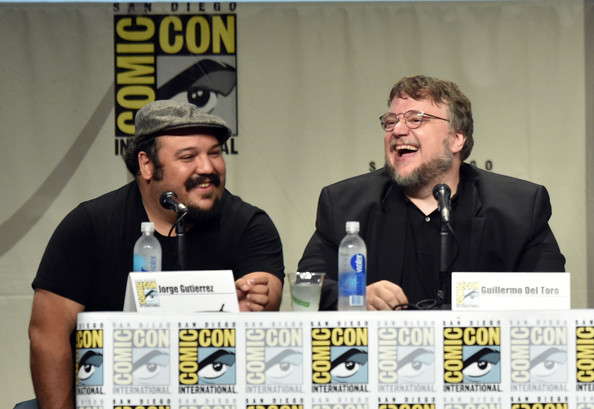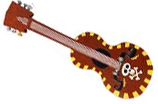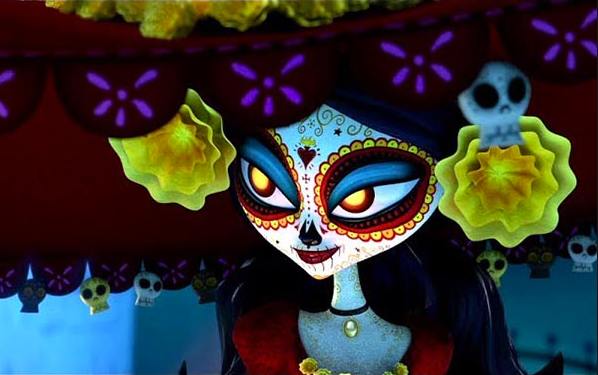Jorge Gutierrez has won two Annie awards and an Emmy, but in order to get his passion project The Book Of Life (which opens tonight!) onto the screen, he needed a little help. Gutierrez found it in Guillermo del Toro. The Mexican fantasy director has been using his production company to foster new visions in genres like horror and animation. A little bit Orpheus and Euridice, a little bit Dia de Los Muertos, and a little bit musical theater, The Book Of Life is anything but ordinary.

Anne Marie here. I was lucky enough to interview Guillermo del Toro and Jorge Gutierrez when they came to San Diego Comic Con in July. But before I could even start asking questions, del Toro noticed the squid design on my necklace, and launched into a rhapsodic monologue about his favorite movie, 20,000 Leagues Under The Sea. From that point on, I basically just held on to my seat as del Toro and Gutierrez riffed on each other with the ease of good friends and partners. They discussed everything from Ray Harryhausen to the purpose of a director to whether children’s movies need bad guys.
Here's how it went...

GUILLERMO DEL TORO: [20,000 Leagues Under the Sea] is a magnificent movie. And to this day I collect models of the Nautilus.
ANNE MARIE: Of the Nautilus?
GUILLERMO DEL TORO: Yeah. I have, I think I have most every one, except the ten meter one, which is too big for me... But I have the 3 ft one. I have the little ones, the medium ones, the electric ones, the ones that light up [JG laughs] the ones that make a little noise, all of that. That and The Time Machine are my two favorite sort of steampunk-y pieces of design.
JORGE GUTIERREZ: It’s awesome. It holds up, too. Anyways! [Laughs]
ANNE MARIE: You’ve both described The Book of Life as a personal pet project. Can you talk a little about the process of getting it going?
JORGE GUTIERREZ: Absolutely! Fifteen years I’ve been working on this, based on a student short I did at Cal Arts. When I graduated I pitched it everywhere. Everyone said, “Nah, you’re just a kid out of school. No one wants to see this stuff.”
GUILLERMO DEL TORO: “You don’t understand.”
JG: “You don’t understand. We need talking animal movies.” Literally, that’s what I was told at every meeting.
[More...]
JG: Cut to many years later. My wife and I… we did a show called "El Tigre" on Nickelodeon, so things started to--y’know, people started to believe that maybe I knew what I was doing.
GdT: I was a fan.
JG: Cut to me going to [del Toro’s production company] Bleak House. For me it was like going to the Justice League Hall and pitching to Batman.
Worst pitch in the history of pitching. Y’know it was 110 degrees, it was August, we made the horrible decision to put all of the artwork outside next to the pool. There was a beautiful statue of Ray Harryhausen judging me as I was getting ready for the pitch. And the moment I opened my mouth to pitch, these people betrayed me in the house next door. There’s three gardening guys going [sings] “AHHHHH” and Guillermo just said, “Shout it to me!” So there I was, the worst pitch in the history of pitching, five minutes of me yelling at him, “AND THEN THIS REALLY ROMANTIC MOMENT HAPPENS!” And at the end I was drenched. I was just ready to shake his hand and get out of there. But he saw right through all that horribleness.
GdT: I mean, I’ve produced many first time directors now. It’s something I like. I don’t know if it is masochism or altruism, but it’s something!
JG: And what other director does that? I mean, he is the patron saint of film.
GdT: I’ve only been wrong once, but normally my instinct tells me, “get involved.” It’s important. And it’s important to protect things that are unique. And already in the images Jorge had, there were easily a dozen images that I thought were world class. Powerful. Perfect. And that his vision was there. So whatever; it was ungainly, it was overwrought. And the miracle for me was the lack of objectivity I have with my films, which makes me go overwrought, over-whatever-it-is, I don’t have that when I’m producing for someone else. When I’m producing for someone else, I acquire a sage kind of brain, and I’m able to zero on the problem. And we sat down again, and I repitched the movie. I said “Let me pitch you a second version.” We modeled it after Orpheus and Euridice.
JG: Yeah.
GdT: “I love your world. You like this idea? Let’s make it.” And we did it. And it was a very, very, uphill road because it took us six or seven years to get it made... In Hollywood, you hear “Love,” the word “Love,” more than any other word. And the second word you hear most is “no.” “We love it, but no.” Y’know?
JG: Or “We love it, but it’s just too different.”
GdT: Too different. And y’know, I knew that we needed to protect his images. I knew that if he went unguarded into the swamps of production, by the end of it all, it would be talking animals [laughs] so to speak, y’know? And… one day I said, “The second best version of this movie is not making it.”

Anne Marie: Wow. So when you start the design process, creating this incredible world, or creating the world of Pan’s Labyrinth, or El Tigre, where do you start?
GdT: We start with the story.
JG: Yeah. I mean, I have a writing partner, but I start designing in the script. I start describing what things look like. I had an art director, Paul Sullivan, and a production designer, Simon Varella, who’d read the stuff and we’d just talk. Show ‘em movies, show references - a lot of those guys would laugh because I would say, “This needs to hurt. When you make this, if you didn’t suffer making it, it’s not good.” It’s, uh, very Catholic.
[Laughs] Self-flagellation?
JG: Self-flagellation. And that was sort of the approach to the movie. This movie needs to feel like you suffered to make it. [Laughs]
GdT: Well we knew Jorge had this vision from the beginning where the characters and the world had to feel animated. We needed to feel like craftsmanship had gone into it, that they were not--See, a lot of people get the impression that computer animated movies are made by computers. And this is actually the perfect antidote to that. It looks like a handmade puppet film, in a way but a lot more fluid and a lot more flexible in a way. And Jorge had that vision from the start.
Something Ray Harryhausen would like?
GdT: Or George Pal Puppetoons!
JG: Yeah the Puppetoons! And I always believe that, with time, if your movie’s designed to look classic and old, time will be your friend. It’ll age even better.
It’s why people still watch Ray Harryhausen films. Because you see that artistry in the work that they produce.
JG: You can see the hands of the artist in there.
GdT: I was just recently re-watching The Golden Voyage [of Sinbad] and Jason [and the Argonauts] on BluRay.

JG: They look amazing!
GdT: They look amazing! And y’know, you can say, “the chemical composite process y’know it’s a little green here,” but other than that--but the animation is just so gorgeous. It’s like… [pauses] It’s timeless. And actually, I think The Golden Voyage and Jason are really goddamn good movies.
From everything we keep referencing, you’ve clearly got so many influences in The Book of Life. You talked about Orpheus & Euridice, you’ve got a little bit of Book of Job in there--
JG: Yeah yeah yeah!
--and a lot of Mexican pop culture, a lot of American pop culture, how did you bring all of these disparate elements together?
JG: Well, well he loves fairytales, and I love mythology, so it kinda all came together. And then we both love a lot of the same things. And I always joke with him that I saw The Devil’s Backbone when I wrote my first treatment of this movie.
GdT: Which makes me feel old. [Laughs] It is kind of funny ‘cause I think the one thing I know for a fact is: a director is a filter, like a coffee filter of ideas, and you put everything through it, and a director will not let things that are not good for you go through. And it will give you the purest brew. And Jorge’s like that. Jorge’s influences are anime, video games, Fleischer cartoons…. whoever you want. But he’s able to distill it to be Jorge. And I think that’s a testament to whatever anyone brings -- Paul Williams, Gustavo, myself, anyone --it ends up being Jorge.
JG: Aww.
GdT: So that’s the sign of a great director.

